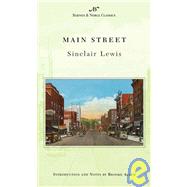From Brooke Allen’s Introduction to Main Street
Main Street is very, very American, but it is not purely American. Shaw, in his characteristically flippant manner, spoke the truth when he said that Lewis’s criticisms applied to other nations as well, but that Americans clung to the idea that they were unique in their faults (Literary Digest, December 6, 1930); the British novelist John Galsworthy remarked, truly, that “Every country, of course, has its Main Streets” (Lewis, From Main Street to Stockholm: Letters of Sinclair Lewis, 1919–1930). Still, a disdain for intellect (or for what we nowadays prefer to denigrate as elitism) has been particularly marked in America, perhaps because of our commitment, stated if not practiced, to egalitarian democracy: On Main Street, Lewis writes, “to be ‘intellectual’ or ‘artistic’ or, in their own word, to be ‘highbrow,’ is to be priggish and of dubious virtue.”
More than eighty years after Lewis’s novel this is true, and it is true not only on Main Street but on Wall Street as well, and on Park Avenue, and on Pennsylvania Avenue. This is what makes Main Street such a stunning achievement: While it succeeds in being “contemporary history,” capturing a particular place at a particular moment in time, it also speaks for our own time; it is remarkable how much of Main Street is still pertinent. Gopher Prairie at war is not so very unlike our own flag-waving “war on terrorism.” Will Kennicott’s breezy dismissal of legal procedure—“Whenever it comes right down to a question of defending Americanism and our constitutional rights, it’s justifiable to set aside ordinary procedure”—can be read on almost any editorial page today. Gopher Prairie’s commercial ethos of material “progress” at the expense of every other variety, an idea Lewis would expand and crystallize in Babbitt, has been refined rather than improved in our own era of no-collar workers who meditate or practice yoga before closing the Big Deal rather than smoking cigars and guzzling alcohol.
Lewis, unlike so many of his contemporaries, was never tempted to look for an answer in political dogma: He hated dictatorships and had no particular faith in the virtue or good judgment of “the people.” All he really believed in was the wavering, imperfect liberal spirit: “Even if Com[munism] & Fax[cism] or both cover the world, Liberal[ism] must go on, seeming futile, preserving civilization,” he wrote in his notes for It Can’t Happen Here (quoted in Lingeman).
An atheist with no political illusions, two failed marriages, an unconquerable addiction to alcohol, and a moribund talent might be thought to have had every reason to give up in despair. Lewis, to his undying credit, did not. “It is a completely revelatory American tragedy,” he said in his Nobel Prize speech, “that in our land of freedom, men like [Hamlin] Garland, who first blast the roads to freedom, become themselves the most bound.” This has been true of many; it was never true of Lewis. Like Carol Kennicott, he was still reaching—though generally failing to grasp—right up to the end. His particular type of sociological fiction had gone out of fashion at the time of his death, and he continued to be undervalued for decades afterward. But in recent years we have returned to an appreciation for what he accomplished artistically. For what he was able to tell us about American life, in his day and in ours, we can only be grateful.
